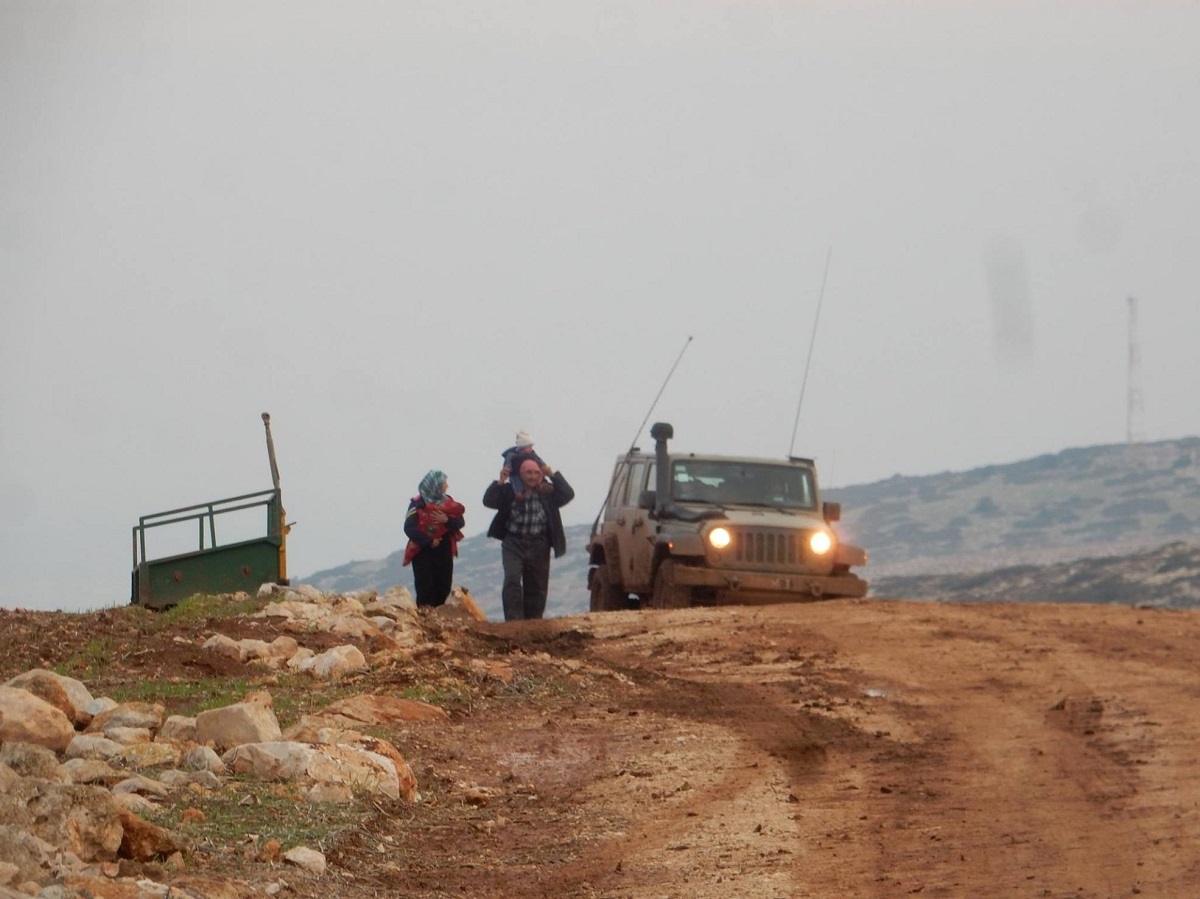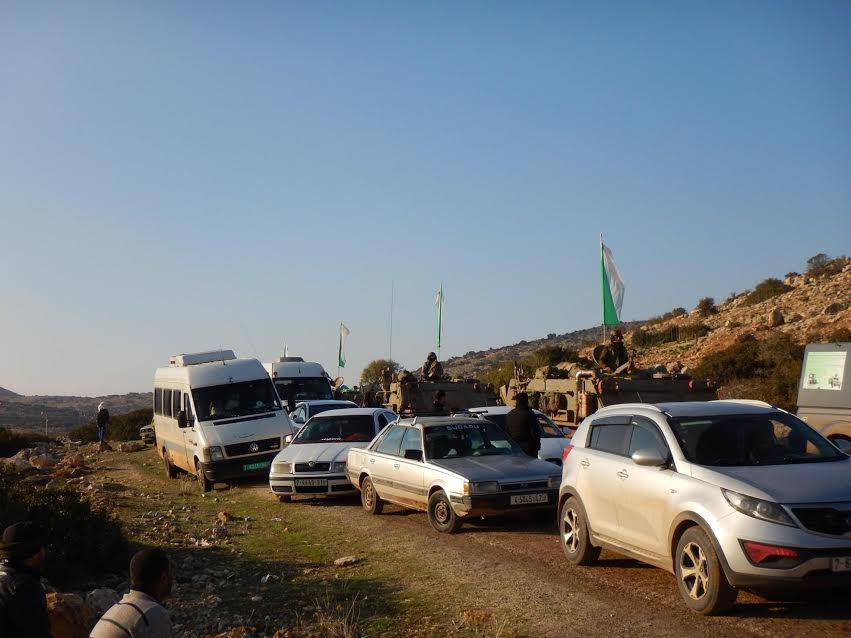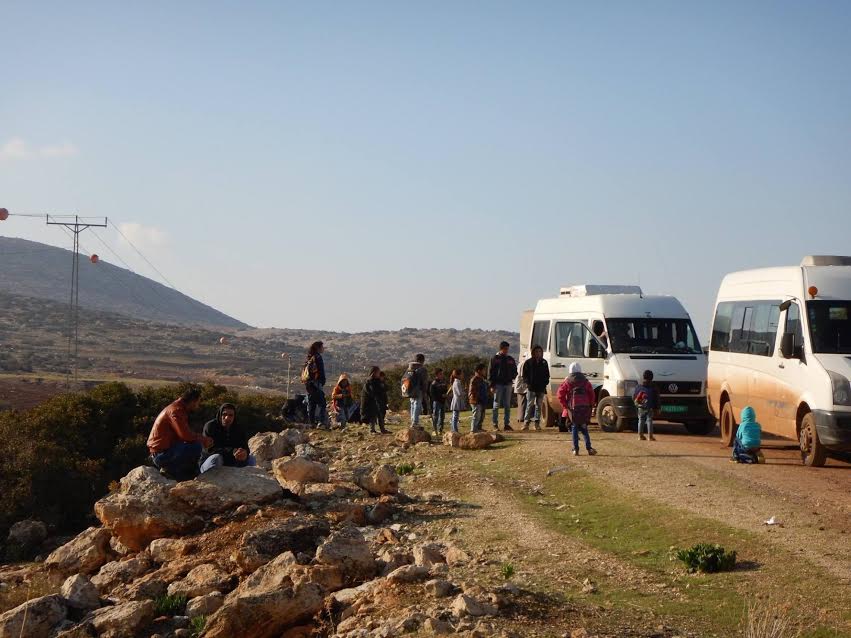Gochya, Jordan Valley, Tayasir
All tracks connecting the Palestinian Jordan Valley with the West Bank localities of Aqraba, Beit Furik and Toubas are now blocked with earthen dikes, ditches, huge boulders and locked gates . Even those opened in the past few years have now been blocked again.
. Even those opened in the past few years have now been blocked again.
Only Gokhia Gate which separates the Jordan Valley from Nablus and Toubas is open today (since Sunday, according to local inhabitants). All of a sudden there are no “security grounds”, no “danger to Palestinians because the area is used for maneuvers” – of all times, when the maneuvers are on, the gate is open (to enable war machines free passage without delay every time it has to be opened and closed). Nearby, 3 APCs and bored soldiers are seen. A military exercise is taking place again in the Palestinian Jordan Valley. We entered, but couldn’t get through to the first encampment because of the thick mud. It was raining heavily for two hours this morning and the entire region turned into one big swamp.
3 youngsters of the Bsharat family tell us about the confiscated tractors that have not been reclaimed, and of the repeated maneuvers on account of which the inhabitants are evicted from their homes for long hours, day and night.
Today the expulsion is not here, at Ras Al Ahmar, but in the north, near the Separation Fence between the Palestinian Jordan Valley and Israel. Villagers of Ibzik were evicted for today and tomorrow from 8 a.m. until 4 p.m. Later many Palestinians would tell us of the hardship that inhabitants suffer having to leave their home in this winter cold with no place to spend this time – babies, children, the elderly, and the ill.

From 12 noon until 4:30 p.m. the road ascending to Tyassir and the West Bank was blocked because of the army’s maneuvers. Long lines of Palestinian vehicles were seen from Al Malih, where 2 bored soldiers were stopping traffic. The soldiers had no idea when the road would be open again. The Palestinians, mostly men, day workers on their way home from their work in the settlements – were loafing around on the road, smoking. Some asked us to ask the soldiers to let them get home – here, there, 200 meters way, in Al Bourj. But the soldiers claimed they had orders not to let anyone through, no exceptions.

We were also in phone contact with Mahdi who was on the other (western) side of the blockage, and he spoke of long waiting lines there as well. Worst of all – school and kindergarten children (like Rina, for example, daughter of Yusef of Makhoul, all of 5-years old) had to wait on the road for 4.5 hours! They roamed around among the APCs, pleading the soldiers for some food, they hadn’t had anything to eat since morning.

This is the routine of life of Palestinians under occupation. Here maneuvers, there a “security situation warning” – no matter what the pretext, putting a halt to the inhabitants’ life is always handy.
The way to Abu Saker was closed on account of the mud. The gravel track he had prepared in the summer was destroyed and blocked by the occupation army. 5 families now live beyond the swamp, separated from civilization (unless a tractor is mobilized for emergencies or to bring the children from the main thoroughfare, which naturally serves the settlement). Still, every single attempt by the inhabitants to redo this gravel track in order to maintain some minimal form of human life is blocked violently by the army.
Expulsion takes place in so many varied ways for after all, we are not like the gentiles. We do not publicly disclose our real face. No way. We are more moral, we don’t expel, we just teach our own school children Rehav’am Ze’evi’s transfer doctrine heritage, we only confiscate the only means the Palestinians have for transporting water, we only demolish their miserable dwellings (in the name of “the law”), we only block every single access track to Palestinian localities, we only hold army maneuvers in crowded populated areas, only this and only that. It all boils down to one word (maybe two) – ethnic cleansing of civilian population. Yes, even if we break this down to actions, it all means transfer. Not of the 20 Jewish settler families of Amona who are, eventually, being offered the world. Transfer of people who have lived here for many generations before some religious Jews envisioned “settling the country”, a transfer of people some of whom have already been expelled from elsewhere (including the now Israeli area of pre-1948) and all they want is to live the life to which they have been born, to survive in this harsh place.
More, from occupation routine and its agents: Mohammad Al Kabir (“the big one”) lives with his family opposite Maskiyot settlement. The settlers above, he below, as usual. (This is the family of little Bisan whom Shula and Hanna were active to provide medical care for this paralyzed child). Across the road.
The flock is herded by Mohammad’s sons, Ali and Ahmad, south of the settlement, at quite a distance away. (Beyond the area allotted the settlement officially). For some years they hav grazed there, not disturbing anyone. But they do disturb the settlers’ appetite for expansion and land-grab. Now the settlers have decided to let their cattle graze there of all paces. And since then, harassment by the Maskiyot settlers and with the constant of “our dear sons, the soldiers” has been ongoing:
- A week ago, Ali was grazing his flock there, when Rami, the Maskiyot security official together with another settler arrived and beat him up. Rami also summoned the army for help and they took Ali to Tayasir checkpoint and held him there for about 5 hours. Since they had no grounds to detain him, he was released at nightfall.
- Last Saturday Ali’s brother, Ahmad, was grazing at the same spot when settlers arrived, fired in the air (weapons given to them by the State for “self defense”), chasing him away.
- On Monday settlers arrived with a flock of cattle and surrounded him and his sheep, threateningly, until he was forced to leave.
- Today too, December 20, 2016, 5 settlers arrived and threatened defenseless Ahmad so he had to get away (the fact that they bear arms is enough of a threat).
Ahmad and Ali intend to continue grazing there for that is where they always have, and they have no other grazing area, as all of the ground across the road is a firing zone
Taayush volunteers intend to begin accompanying them to pasture and even staying with them nights, since the settlers come at nighttime to threaten the inhabitants.
All photos by Aaref Daragma
